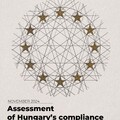The European Commission has not yet approved the Recovery and Resilience Plan (RRP) submitted by the Hungarian Government in mid-May. This would be the condition for Hungary to have access to the billions disbursed by the EU to address the effects of the COVID pandemic. The protracted decision carries a political message: the Commission is not convinced by the reform plans of the Orban Government regarding anti-corruption and the rule of law.

In our previous blog post, we addressed how the Recovery Plan presented by the government has ignored the recommendations that the European Commission and the Council have repeatedly made over the years to strengthen the country's anti-corruption framework.In this post the EU we examine the institutional safeguards with the Hungarian funds management system.
It is not an arbitrary decision to tackle corruption
It is important to note, that the Commission cannot decide arbitrarily whether to accept or reject the recovery plan of a member state. The EU regulation on the RRF specifies the criteria for evaluating the submitted materials. According to point 2.2 of Annex V of the regulation,
if the plan does not contribute or only partially contributes “to effectively addressing all or a significant subset of challenges identified in the relevant country-specific recommendations, or challenges identified in other relevant documents officially adopted by the Commission in the context of the European Semester”, then the plan as a whole is rated as inadequate and thus no financial contribution can be awarded to the Member State.
However, the Commission has some leeway in what it considers to be a "significant part" of the challenges - recovery plans of some Member States were given the green light without responding to all country-specific recommendations.
There is another important point in the evaluation criteria set out in the regulation that deals specifically with corruption, even in those Member States where the improvement of the anti-corruption framework was not part of the recommendations of the European Semester. The EU is placing increasing emphasis on ensuring that resources from its budget do not serve the purpose of corruption, but make a real contribution to strengthening the economies of the Member States instead. Therefore, the regulation also stipulates that each Member State's recovery plan must include appropriate measures directly aimed at preventing corruption, conflicts of interest and fraud in the use of the instrument.
The Hungarian RRP has a reduced content as the government did not want to accept loans from the EU Recovery Fund, despite low interest rates. At the same time the government is using Russian or Chinese loans to fund major investments as well as issuing foreign currency bonds at less favourable rates. This suggests that the Hungarian government is trying to get over the negotiations with as little compromise and exposure as possible.
Who is protects the EU's financial interests?
Part 3 of the latest version of the RRP, published in July, deals with the institutional system of the RRP, and as already mentioned, appears as a “reform” in component ‘I - Horizontal measures’ for two short paragraphs. We can still only guess to what extent the implementation of the RRP counts as a reform, except that it contains the words “anti-corruption” and “fraud”. However, if we take a closer look at the section on the implementation of the RRP, we see that the Government has by no means made serious, novel commitments to prevent the misuse of recovery funds.
The lion's share of the tasks has been allocated to the Prime Minister's Office, although for some components the various ministries carry out the operational tasks. In component “I” related to corruption commitments, the Prime Minister’s Office is the body responsible for implementation, but on certain “reforms” they cooperate with the Ministry of Justice and the Ministry of the Interior. Within the Prime Minister's Office, the Deputy State Secretariat for the Implementation of the RRF Plan and Legal Affairs for Development Policy, which is responsible for EU programs, performs the implementation tasks as National Authority, and is subordinate to the State Secretariat for European Union Development.
The Deputy State Secretariat itself, i.e. the National Authority, has a total of 51 staff, of which only 6 will be employed by the RRF Objection and Irregularity Management Unit under the Development Policy Legal Department - essentially this unit will be responsible for investigating irregularities, fraud and suspected corruption.

 It may be an important background information that the coordination of EU developments was transferred from the Ministry of Innovation and Technology to the Prime Minister's Office only at the beginning of this year, although it is a fact that since September 2020, this area has been managed by Szabolcs Ágostházy (left), former Head of the Cabinet of Gergely Gulyás (right) , Head of the Prime Minister's Office. According to analyses by various news portals, the main reason for the reorganization may have been that the management of EU money will be brought closer to the immediate environment of the Prime Minister.
It may be an important background information that the coordination of EU developments was transferred from the Ministry of Innovation and Technology to the Prime Minister's Office only at the beginning of this year, although it is a fact that since September 2020, this area has been managed by Szabolcs Ágostházy (left), former Head of the Cabinet of Gergely Gulyás (right) , Head of the Prime Minister's Office. According to analyses by various news portals, the main reason for the reorganization may have been that the management of EU money will be brought closer to the immediate environment of the Prime Minister.

In fact, the oversight of EU programs has never been considered completely independent, but it is revealing that just this year the area was transferred to an organization run by a party man, instead of being given an autonomous office within the public administration. (Of course, it is not new that the Prime Minister's Office absorbs all areas that are important to FIDESZ for some reason: Gulyás also oversees areas that are not connected at any level, such as the Paks investment or helping persecuted Christians.)
Despite the fact that according to the organizational and operational rules of the Prime Minister's Office, the Development Policy and Legal Department and the RRF Objection and Irregularity Management Unit will not be instructed in evaluating irregularity decisions and objections, it is questionable how seriously this can be taken if the unit will be fully integrated into the State Secretariat and the Prime Minister's Office. Their work and compensation will be decided by their superiors, and they can be instructed in any other matter related to the recovery funds. (The confusion is compounded by the fact that the Recovery Plan does not describe the structure of the Deputy State Secretariat for the Implementation of the RRF Plan and Legal Affairs for Development Policy the same way as set out in the Prime Minister's Office's organizational and operational rules (OOR): for example, while there are three different units under the Development Policy Legal Department in the OOR, there is only one in the RRP. Moreover, the OOR has a so-called “Development Policy and Control Department” within the National Authority, which would among other things liaise with OLAF, and carry out inspections initiated by external bodies - the RRP however is silent on this, so we do not know how it would perform its duties.)
All this hardly indicates a solid anti-corruption institutional framework or a clear demarcation of responsibilities. This is all the more questionable because, according to a previous draft of the RRP, for example, a maximum of 2-2 out of 6 people working in the Development Policy and Legal Department will deal with irregularities and objections, and two of them may be entrants.
Government Decree 413/2021 (VII. 13) on the implementation of the RRP, which defines the institutional system contains hardly any concrete mechanisms for the prevention of fraud, conflicts of interest and corruption, but merely reiterates that the bodies involved in the implementation of the RRP must take these aspects into account in developing their operation. In addition, the regulation refers several times to the institutional system of "traditional" grants, i.e. grants distributed over seven-year budget cycles - however, this may lead to uncertainties between the role of the Audit Authority, i.e. the Directorate General for Audit of European Grants (EUTAF) under the budget heading of the Ministry of Finance, which provides external audit, and the National Authority (i.e. the Deputy Secretary of State responsible for the implementation of the RRP).
Missing mechanisms, bluffed solutions
When it comes to procedures for dealing with irregularities, rapid access to the recovery funds seems to be a much more important aspect than the detection of suspicious cases. The following rules in the regulation may be of particular concern:
irregularity proceedings can only be initiated after the conclusion of the grant agreement (§ 72) – i.e. there is no control system that would filter out risky mechanisms during the tendering process;
the head of the National Authority, i.e. the Deputy State Secretariat of the Prime Minister's Office, decides to initiate irregularity proceedings even if the suspicion of irregularity arises in connection with the activities of the national authority, or the suspicion of irregularity was reported by the audit authority: therefore, if someone reports an irregularity in the National Authority's failure to supervise, for example, the public procurement related to a grant contract, the Deputy Secretary of State himself will initiate the irregularity proceedings - if he chooses to do so;
there is no option to appeal against a substantive decision on the irregularity.
Unfortunately the RRP does not contain concrete mechanisms to combat corruption either: although the chapter on Fraud and Corruption mentions the Medium-Term Anti-Corruption Strategy, as well as the Fundamental Law, the Criminal Code and practically every peice of legislation in which the word “corruption” occurs, it does not mention how these legal instruments specifically serve the purpose of curbing the misuse of the recovery funds. This is particularly evident in the context of the Anti-Corruption Strategy, which contains no measure at all to manage or analyze the risks associated with spending the EU funds. It is a fact, however, that both the regulation about the implementation of the RRP and the Recovery Plan repeatedly suggest that the National Authority will (in the future) develop a so-called “RRP Anti-Fraud Strategy”, but nothing is known about its specific content either. In this sense, it can only be considered as a kind of bluff, just like the anti-corruption working group involving NGOs, which was announced by Mr Ágostházy, but apart from an interview, no trace of it was found in either the Government resolution or the RRP.
 Furthermore the plan presents the www.anti-lop.hu website as an effective means of preventing corruption. The site was created in 2007 (!) to enable reporting irregularities regarding EU projects and is operating in essentially unchanged form ever since. However, neither the website nor any other source reveals what irregularities were reported by the whistleblowers in relation to which EU tenders, or on what basis the investigating authorities may have decided to reject the complaints. In addition, as is clear from their response to Freedom of Information request, they do not keep statistics or carry out analyses. It should be emphasized here again that the RRP relies almost entirely on existing mechanisms and structures, which have so far failed to ensure sufficient transparency and the prevention of corruption. Regarding irregularities in previous EU funding cycles, different managing authorities only publish an excel list. These are neither following the same structure, nor do they reveal the number of irregularity proceedings launched or disclose who the initiator of the proceeding was or the share of dismissed complains.
Furthermore the plan presents the www.anti-lop.hu website as an effective means of preventing corruption. The site was created in 2007 (!) to enable reporting irregularities regarding EU projects and is operating in essentially unchanged form ever since. However, neither the website nor any other source reveals what irregularities were reported by the whistleblowers in relation to which EU tenders, or on what basis the investigating authorities may have decided to reject the complaints. In addition, as is clear from their response to Freedom of Information request, they do not keep statistics or carry out analyses. It should be emphasized here again that the RRP relies almost entirely on existing mechanisms and structures, which have so far failed to ensure sufficient transparency and the prevention of corruption. Regarding irregularities in previous EU funding cycles, different managing authorities only publish an excel list. These are neither following the same structure, nor do they reveal the number of irregularity proceedings launched or disclose who the initiator of the proceeding was or the share of dismissed complains.
Transparency is not among the strenghts of the existing EU Tenders Portal (palyazat.gov.hu) anyway: data on tenders and their winners cannot be downloaded in bulk (the system allows exporting up to 300 items), filtered or compared. The search engine itself is difficult to use, and while there was a feature on the website ten years ago that displayed the grants on a map, it is no longer available today. Another problem is that the tender documentation is incomplete for almost all projects (for example, the persons assessing the project are hardly ever listed, and changes - such as extensions of deadlines - are difficult to follow). The projects of previous cycles - and those responsible for them due to the changing ministerial structures - can hardly be traced. Due to the state of freedom of information in Hungary, it is often necessary to pay a fee or file a lawsuit in order to obtain the actual documents of tenders from the ministries. It is therefore particularly sad that the RRP does not contain any commitment to make the data publication on EU funds more transparent, including information on the ultimate beneficiaries, contracts, audits and assessment.
Stakeholder involvement is another shortcoming when it comes to the planning and implementation of EU projects. Social dialogue has been emptied out in Hungary alltogehter and consultations with civil society and sectoral expert groups rarely happen. Anti-corruption organizations were not invited to contribute to the planning of horizontal measures. The consultation of the RRP was rather formal, with no specific responses to submitted comments. We have already discussed problems around the operation of monitoring committees, which also include professional, local government and civil society members. There are no signs that there would be special monitoring committee established in connection with the recovery fund.
It seems that the Government envisages the distribution of the RRF funds within the above-mentioned, imperfect institutional system. It is hard to name significant positive developments regarding funds management, as there are only a few alltoghether. One of the welcomed developments is that the electronic public procurement system has been connected to the IT system for managing tenders, i.e. the public procurement data associated with the tender can be accessed directly during the implementation and monitoring of tenders. Unfortunately this feature is not available to the general public. Although the use of Arachne modules during the implementation of the RRP could provide a kind of risk assessment for potential misuses of a given tender using various indicators and databases (such as of ownership or public procurement), but the exact indicators and mechanism to be applied or the fields of intervention are not specified. In essence, the RRP only states that Hungary will use this tool during the implementation of the recovery plan and that data on tenders to the Arachne system will be uploaded on a quarterly basis. It is unclear whether the Hungarian authorities will transmit all these data to the Commission and what the consequences are if the instrument considers tenders or applicants to be risky.
It may also be worth discussing how the RRP envisages the control of public procurement related to the implementation of tenders. Here again, we stumble upon the old question of “who guards the guardians?”, namely the Hungarian institutional system simply makes the prevention of conflicts of interest and corruption the responsibility of the contracting authority, and hardly deals with cases where the contracting authority or possibly the implementing body itself can manipulate public procurement. Not only does this raise integrity issues, it also does not make things easy for contracting authorities. According to the RRP, it would be their task to browse the following databases in order to ensure the conflict of interest of the tenderer:
the company registy by the Ministry of Justice
database of taxpayers free of public dues of the National Tax and Customs Administration of Hungary
the register of the Public Procurement Authority on banned bidders, as well as on bidders excluded due to false data provision or breach of contract in violation of the Public Procurement Act
the register of the Department of Occupational Safety and Health on employers who have committed labor and health and safety violations
the register of fines for public order offences managed by the National Directorate-General for Aliens Policing
the database of competition law resolutions of the Competition Authority
the register of construction contractors of the Hungarian Chamber of Commerce and Industry
internet databases providing information on business-to-business relations, legal representatives of companies and their managers
various internal databases
public media information
It is quite dissonant that even the audit authorities do not necessarily have direct access to these databases - and it is only wishful thinking for contracting authorities to have access to these databases (even though it is mandatory to check them) through the Electronic Procurement System (EKR) due to the RRP's restrained ambitions. This is also a particularly important topic because a significant part of the RRP's measures also include construction investments, a sector with a number of infamous bidders that have ties to the government party. Altough these investments are unlikely to start before the first quarter of 2022, Fidesz's favorite communications companies can already prepare: despite the fact that the RRP has not yet been approved by the Commission, calls for proposals to prepare specific actions in some components have already been launched this summer. In these calls we come across resources allocated to communication quite often.
Beyond listing the generalities, one of the most often voiced methods for preventing conflicts of interest, fraud and corruption in the RRP is to require the submission of various declarations of conflict of interest and transparency, and the signing of corruption clauses from applicants, tenderers and essentially all actors - but in the wake of the corruption cases involving EU money in recent years, can we really think that this will hold anyone back?
K-Monitor strives against corruption and promotes the transparency of public spending in Hungary. Support Us!
Címkék: english RRF
1 komment
A bejegyzés trackback címe:
Kommentek:
A hozzászólások a vonatkozó jogszabályok értelmében felhasználói tartalomnak minősülnek, értük a szolgáltatás technikai üzemeltetője semmilyen felelősséget nem vállal, azokat nem ellenőrzi. Kifogás esetén forduljon a blog szerkesztőjéhez. Részletek a Felhasználási feltételekben és az adatvédelmi tájékoztatóban.





